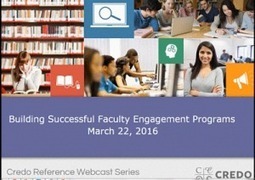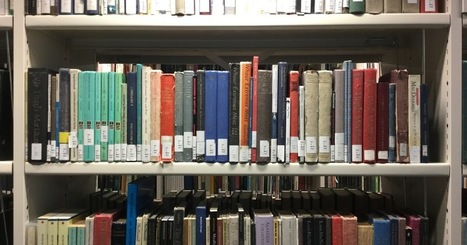In case you are interested, I came across it whilst searching for articles from this other PhD study of IL integration in New Zealand higher education
Get Started for FREE
Sign up with Facebook Sign up with X
I don't have a Facebook or a X account

 Your new post is loading... Your new post is loading...
 Your new post is loading... Your new post is loading...
Current selected tags: 'embedding information literacy', 'information literacy'. Clear
Pam McKinney here live blogging the final keynote from the LILAC conference featuring Professor Alison Littlejohn, Dean of learning and teaching in the faculty of social sciences at the University of Glasgow. Allison began by outlining the neo-liberalisation of the higher education sector, positioning students as consumers and the rise in importance of the national student survey. Allison was involved with a project called “learning literacies in the digital age” which outlined the need for learning to focus on processes and literacies, not content. Allison discussed the power of MOOCs to disrupt education, and to give people the opportunity to learn in a different way, using digital technologies.
Although we face a digital challenge, educators have relied on a distinctly analog approach to solving it. The most prominent digital literacy organizations in the United States and Canada instruct students to evaluate the trustworthiness of online sources using checklists of 10 to 30 questions. (Common Sense Media, the News Literacy Project, Canada’s Media Smarts, the University of Rhode Island’s Media Education Lab, and the American Library Association all disseminate website evaluation checklists.) Such lists include questions like: Is a contact person provided? Are the sources of information identified? Is the website a .com (supposedly bad) or a .org (supposedly good)?
Elizabeth E Charles's insight:
Great argument for information/digital literacy being embedded into the curriculum rather than just relying on a one-shot session.
In the most recent installment of our #ReferenceStrategy webinar series, four librarians shared strategies they've used to build successful faculty engagement programs on their campuses. Rebecca Donlan outlined a program Florida Gulf Coast University created to enhance their culture of inquiry "from composition to capstone." Horry Georgetown Technical College's Nicole Romyak and Chris Williams explained concrete examples of initiatives they've taken to reach out to faculty on their campus and the results such efforts have yielded. Jennifer Hill from Excelsior College outlined how her institution's course development teams have benefitted faculty, librarians, and students.
A new report from ACRL spells out the findings of a massive student learning assessment project. I still have some questions. There’s a new report out from the Association of College and Research Libraries summarizing the findings of the second year of a project called Assessment in Action, an ambitious attempt involving over 200 institutions to see how libraries contribute to student learning and how we can measure that contribution. (A report on findings from the first year of this project is also available. I’m just late catching up on my reading.) The librarians involved in this massive project offer a trove of ideas about how we can assess a library’s contributions to learning, and it’s all available online, including survey instruments, rubrics, and more. Each team devised their own question to focus on, one that reflected institutional goals, and summaries of what they learned are available in a searchable database. If you’re a librarian doing assessment of learning, this is an amazing resource. |
From
lucidea
I’ve learned many things over my over 40 years as a librarian. That said, we don’t, as professionals, sufficiently embed learning at the core of our practice.
The Internet has changed contemporary workplace skills, resulting in a need for proficiency with specific digital, online and web-based technologies within the fields of medicine, dentistry and public health. Although younger students, generally under 30 years of age, may appear inherently comfortable with the use of technology-intensive environments and digital or online search methods, competence in information literacy among these students may be lacking.
The next session I attended at the i3 conference was Edward Luca (an academic librarian at the University of Sydney) on Truly embedded librarianship: rethinking information literacy through understanding disciplinary information practices in higher education.
There’s always been a gap between |





![[Un]intended consequences of educational change: The need to focus on literacy development #lilac19 | Information Literacy Weblog | Information and digital literacy in education via the digital path | Scoop.it](https://img.scoop.it/yhH9CewzjcqLVSO178Xq_zl72eJkfbmt4t8yenImKBVvK0kTmF0xjctABnaLJIm9)










